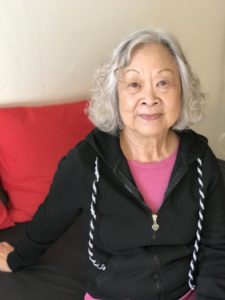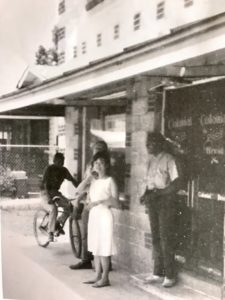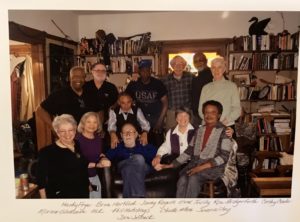Donaldina Cameron’s work inspired many people. One of the most memorable is Marion Kwan, a civil rights activist who marched with the Rev. Dr. Martin Luther King in the 1960s.

Marion Kwan, photo by author
Born and raised in San Francisco’s Chinatown, Marion calls herself a “Cameron House kid.” When Marion’s mother immigrated from China in 1940, she was detained along with Marion’s older 7-year-old sister at Angel Island. After their release, they were met on San Francisco’s docks by one of Cameron House’s Chinese staffers, possibly Mae Wong.
Just like one of the main characters of my nonfiction book, The White Devil’s Daughters, Marion’s mother was sold in China as an eight-year-old as a mui tsai, or child servant. Later, she came to the U.S. as the third wife of Marion’s father, who was a Chinatown merchant. Under the terms of the 1882 Chinese Exclusion Act, Marion’s mother, as a family member of a merchant, was permitted to immigrate from China to the U.S.
Six of Marion’s seven siblings took part in Cameron House’s youth programs in the 1950s and 1960s. As a first generation Chinese American, someone at Cameron House suggested to Marion she could go away to college: she applied and was accepted. One of her professors talked about his experience with civil rights in Mississippi, and with the Delta Ministry –a civil rights organization sponsored by the National Council of Churches.

Marion Kwan in Hattiesburg, MS. in 1960s, photo courtesy of Kwan.
After graduation in 1965, Marion and a classmate decided to join the Delta Ministry. “We knew it was dangerous, but that’s what it’s like when you’re young,” Marion told me. ”I didn’t know it at the time, but Mississippi was the ‘lynching capital’ of the nation and the most dangerous state to be in.”
She and her classmate headed south to Hattiesburg, Mississippi.
“That exposure profoundly changed me; I returned the next year to continue grass-roots organizing in Hattiesburg.”
Marion started a girl’s club in the local community, and worked to integrate the YWCA, the libraries, and tried to integrate the local swimming pool, as well as advocating for African Americans who were denied their social security checks. She did voter registration. She eventually returned home and became an academic counselor at City College of San Francisco for low-income and first-generation college students.
Marion is now part of a group called the Bay Area Veterans of the Civil Rights Movement, which meets once a month and offers outreach to schools and colleges to share their experiences in the 1960s. Here are Marion’s own words on this:
“The struggle for civil rights is not just history; we need to cross lines and be fully engaged allies with all other groups who are fighting for the same justice in this country. Regardless of race, as a multiracial force we can support each other; that’s how the Civil Rights Act was won — a mass movement of different races came together and made the difference. That’s how Cameron House came to be: outsiders, women, and then more women, stepped in and made the difference.”

Bay Area Veterans of the Civil Rights Movement, photo courtesy of Kwan.
Her work today, she says, “is really directly related to the influence of Donaldina Cameron.” Cameron lived for nearly a century, from 1869 until 1968 but Marion never got to meet the pioneering social worker and anti-trafficking crusader since she had retired before Marion came to Cameron House. Several years ago, Marion sat down for a long oral history of her experience in Mississippi. She described how that time – which grew out of her experience at Cameron House – fundamentally changed her. You can read her oral history here.
“Hattiesburg was like my other Chinatown. Two communities rising up for justice and equality,” Marion told me. “The people of Hattiesburg showed me the humanity of their community: what bravery, courage, perseverance and hope was like….”